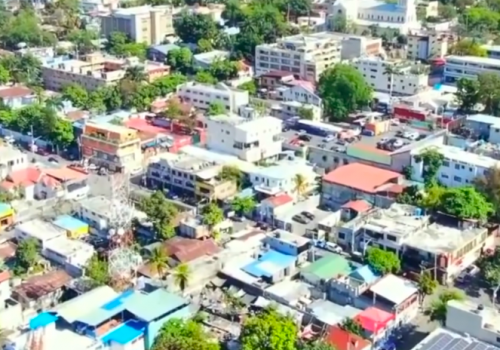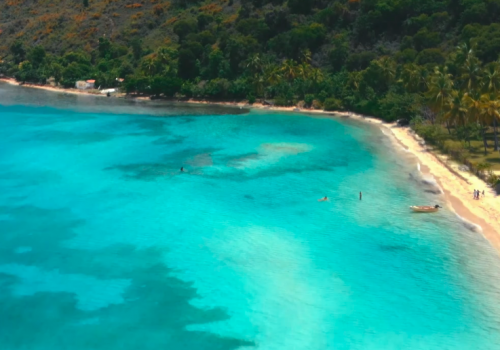A Brief History Of Haiti
The Dominican Republic takes up the eastern two-thirds of the Caribbean island of Hispaniola, with Haiti (View: A Map of Haiti) taking up the western third. Haiti is around the same size as Maryland with a land area of 10,714 square miles. Cap-Hatien, Jérémie, Les Cayes, Hinche, Gonaves, and Jacmel are the principal cities. French and Haitian Creole are the two official languages in Haiti.
On December 6, 1492, Christopher Columbus discovered a kingdom headed by a cacique or Taino Indian leader on the island of Hispaniola. The indigenous population was mostly wiped off after the French came in the seventeenth century to carry on European exploration and exploitation in the Western Hemisphere. Africans (mostly from West Africa) were subsequently transported as slave labor to produce raw items for global trade. In the eighteenth century, Haiti, also referred to as “the gem of the Antilles,” was regarded as France’s richest colony. From 1791 through 1804, Haitians rebelled against the French to protest their exploitation. One of this revolution’s most significant results was that it compelled Napoleon Bonaparte to surrender Louisiana to the United States in 1803, which led to a significant territorial expansion of the American nation. When Haitians gained their freedom in 1804, they replaced the French-assigned name of Saint Domingue with the Taino name of Haiti, or Ayiti in Kreyl.
Prior to the January 12, 2010, earthquake, which left 1.5 million people homeless and caused an estimated 300,000 deaths, 200,000 injuries, and over 200,000 injuries, it was thought that roughly 3 million people resided in Port-au-Prince, the nation’s capital. The 2010 earthquake is thought to have been Haiti’s biggest natural disaster ever. With tales of resistance, uprising, and instability, Haiti has a complex, diverse, interesting, and turbulent culture and history. But one of Haiti’s most important characteristics is its fortitude. Haiti battles to survive despite enslavement, many coups, different occupations, and militarization. Many of Haiti’s proverbs, including “Ayiti se tè glise” and “Dèyè mn, gen mn,” are written etched with the country’s very life.
Haiti is not some remote location unconnected to the United States. First Black Republic and second sovereign nation in the Western Hemisphere, respectively, is Haiti. The bonds that unite the two nations date back to the American nation’s struggle for freedom. The 1779 Battle of Savannah saw participation by more than 500 Haitians under the name Les Chasseurs Volontaires de Savannah. In October 2009, a memorial was built in Franklin Square in the heart of Savannah to honor the participants in that conflict.
Many Saint-Dominguans subsequently settled in Louisiana following the outbreak of the Haitian uprising in 1791. The Haitian uprising had a direct impact on the Louisiana Purchase. With the addition of Louisiana, Arkansas, Nebraska, Missouri, Iowa, Oklahoma, Kansas, Minnesota, the Dakotas, Colorado, Wyoming, and Montana, the U.S.’s landmass increased by a factor of two, doubling its size.
The 1789 French Revolution increases support for the rights of Black and indigenous people of color in the colony among people on both sides of the Atlantic. This activism is severely suppressed by France, which triggers the start of the Haitian Revolution in 1791.
For more than ten years, the Haitian Revolution rages on, destroying a large portion of Haiti’s infrastructure and agricultural resources. In the northwest commune of Gonaves, on December 4, 1803, Jean-Jacques Dessalines accepted the French army’ surrender. For the first time in more than 300 years, Haiti is a sovereign country once more.
Dessalines takes on the responsibilities of Governor-General on January 1, 1804. Later that year, he proclaims himself Emperor; two years later, he is killed. The result is a civil war in Haiti that breaks out between the north and south and lasts until 1820. Following the second peace, Black Haitians are not given political representation.
King Charles X of France accepts Haiti’s request for formal recognition as an independent state in exchange for 150 million francs in reparations (about $21 billion in today’s money, according to Forbes). Haiti borrows money at exorbitant interest rates from American, German, and French banks to pay the costs, which amount to almost 80% of the nation’s yearly budget and ten times its annual revenue.
France lowers its debt in 1838 from 150 million to 90 million francs, or around $12.6 billion. Nearly 150 years after gaining independence, in 1947, Haiti makes the final repayment on its dual debt, which includes loans from the United States and reparations to France.
For African-Americans in the United States during the nineteenth century, Haiti was a glimmer of hope since it was the first black independent nation and had a tale of a successful slave uprising. Because white Americans were concerned that Haiti’s existence threatened their economy, which was based mostly on slavery, the United States, like France, did not recognize Haiti’s independence until 1862. There were many emigration initiatives sponsored by figures such as Martin Delany and James Theodore Holly, who encouraged African-Americans to relocate in Haiti. Nearly 20% of free blacks from the northern United States went to Haiti before the Civil War, despite the fact that most who relocated there later returned to the United States because of linguistic and environmental difficulties. This migration between Haiti and America forged links between the two countries.
However, many African-Americans opposed the occupation of a sovereign state when the United States occupied Haiti from 1915 to 1934, rewrote the country’s constitution, and in many other ways contributed to its enduring instability. Under the direction of Executive Secretary James Weldon Johnson, the National Association for the Advancement of Colored People (NAACP) wrote a number of letters for The Nation criticizing American injustice in Haiti. The famous poet Langston Hughes visited Haiti in 1932 and had a meeting with Jacques Roumain, one of the leading intellectuals in Haiti at the time. Hughes wrote about his travel to Haiti and his encounter with Roumain in his autobiography I Wonder as I Wander: An Autobiographical Journey, published in 1956. Hughes was deeply moved by Roumain and ultimately translated his groundbreaking novel, Masters of the Dew (Gouverneurs de la Rosée), into English. Such discussions between African-American and Haitian intellectuals took place before phrases like “transnationalism” and “Black national consciousness” were commonly utilized.
In October 1954, shortly after Haiti marks 150 years of independence, Hurricane Hazel makes landfall there, killing 1,000 people and ruining the first harvest of coffee and cocoa plantations. After two unsuccessful elections in 1957, the doctor François “Papa Doc” Duvalier takes over. The following year, when he creates murder squads to put an end to his rivals, his cult of personality degenerates into a dictatorial regime. Duvalier declares himself president for life in 1964, a position he holds until his passing in 1971.
Jean-Claude “Baby Doc” Duvalier, Duvalier’s 19-year-old son, succeeds his father as president for life after Duvalier’s passing. But in 1986, a populist uprising forces Baby Doc to leave Haiti. Lieutenant-General Henri Namphy succeeds him.
Following the murders of two candidates and a massacre of Haitian voters, the elections of 1987 are postponed. Leslie Manigat is declared the winner of the military-conducted elections in January 1988. Six months later, Namphy leads a military coup to depose him. General Prosper Avril overthrows Namphy personally in September.
Avril quits in the face of protests. With an estimated 67% of the vote, former Salesian priest Jean-Bertrand Aristide triumphs in the nation’s first free and peaceful democratic elections. In 1991, a coup led by the retired brigadier-general Raoul Cedras overthrew his government. Until Cedras abdicates his position of authority and leaves the country in September of that year, Aristide is exiled.
1994 saw Aristide retake the presidency. His reforms included expanding access to healthcare and education (including adult education and literacy), enhancing the country’s judicial system and civil rights, doubling the minimum wage, providing food to those who were hungry or food insecure, supporting and training people for their livelihoods, and dissolving the military.
After René Préval served as president from 1996 to 2000, Aristide is re-elected despite allegations of fraud. Armed groups-led conflict breaks out across the nation as a result of several failed efforts to undermine Aristide’s government. Aristide departs for South Africa after being forced to resign in a coup in 2004. For the sake of preserving security and stability, a multinational UN peacekeeping force has returned to the nation.
Early in 2004, floods cause damage in several areas of the nation, leaving the nation vulnerable to hurricanes Ivan and Jeanne in September. At least 3,000 Haitians are killed by Jeanne, and another 250.000 are left homeless. Important rice and fruit harvests are lost to flooding.
A little over a year later, Hurricane Dennis kills 56 people and costs Haitians an extra $50 million in damages. In just one month in 2008, there are several natural catastrophes that cause severe damage to the nation’s economy, including Hurricanes Gustav and Ike, Tropical Storms Fay, and Hanna.
Even today, there are still many connections between Haiti and Louisiana in terms of their culinary cultures, languages, buildings, religions, and music.




